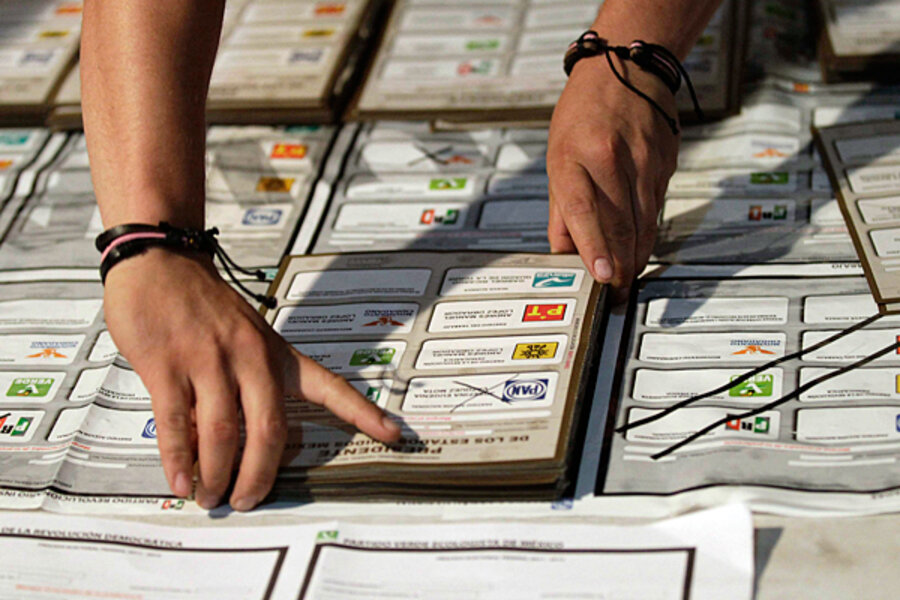Presidential election 'deja vu' in Mexico?
Loading...
| Mexico City
Four days after a presidential election – in which, by a margin of 6 percent, voters chose Enrique Peña Nieto of the once all-powerful Institutional Revolutionary Party (PRI) – Mexico's electoral authorities are in the thick of a recount.
Election officials must recount votes at half the polling stations, as required by law if there are irregularities such as tally inconsistencies. They have said the final results for president should be clear later today and for Congress by Sunday.
Mexico is holding its breath for what lies next. The electoral institute said it doesn't expect the results to alter the victory. But it is not certain the candidate demanding the recount is going to accept the final word. Leftist Andres Manuel Lopez Obrador, who came in second in the election and has not yet conceded defeat, refused to accept electoral results last time he was candidate in 2006. This time his margin of loss is far greater, and ultimately a refusal to recognize the vote could hurt the left more than anything else.
Mr. Lopez Obrador has alleged the election was an overall fraud, including unfair media attention given to the victor and allegations of widespread vote-buying by the PRI. For some, this feels like a political story on repeat: Lopez Obrador is the same man who, finding himself in second position by half a percentage point after the 2006 presidential race, also demanded a full recount. When that wish was not granted in 2006, he declared fraud and led a disruptive protest in downtown Mexico City. He never recognized the presidency of Mexico's leader Felipe Calderon.
The reaction of the nation to his refusal to concede defeat this time around – even after President Calderon and heads of state from around the globe congratulated Mr. Peña Nieto – is divided. Opinion pages are full of differing commentary. On the one hand, many accept a recount and are dismayed that allegations of vote-buying have marred the entire election process. YouTube videos condemning allegations of irregularities, such as voters being bussed into neighboring states, have spread across social media. This reaction speaks to lingering suspicions that the PRI in power means a return to the time when they held a singular grip on Mexican politics.
The PRI, which ruled Mexico from 1929 to 2000, relied on vote-rigging and vote buying to hold onto power for more than 70 years. Now, they are facing criticism today for receiving biased media coverage and accused of handing out gift cards for a major supermarket chain in Mexico City in return for votes. The PRI has denied this.
The civil society group Civic Alliance says that the practice of vote-buying has increased since the group began monitoring the practice in 1994, according to a report they released on the race.
'Top notch' electoral system
And yet others have faulted Lopez Obrador for his widespread distrust of a system held up by experts as top notch. They say he simply cannot accept a democratic defeat. “He has never accepted results, and he is going to play this out and get people on the streets” says George Grayson, the author of a book on Lopez Obrador called “Mexican Messiah.”
Recounts are possible in Mexico if: inconsistencies in the final tally exist, a difference of 1 percent point or less exists between first and second place, or all the votes of one box go to a single candidate. Lopez Obrador, as in 2006, demanded a full recount, but electoral officials said they will only recount half of the ballot boxes. "This is an exercise in openness and transparency," Edmundo Jacobo, executive secretary of the electoral institute, said Wednesday.
Robert Pastor, director of the Center for North American Studies at American University in Washington, defends Mexico's electoral institutions as among the best in the world, and says that Lopez Obrador is within his rights to to allege irregularities and allow institutions to reassess those irregularities. “Mexico has one of the best mechanisms for doing just that,” he says.
All eyes on Lopez Obrador
The question now is what will be Lopez Obrador's next move. His failure to accept results in 2006 when he went on to declare himself the legitimate president of Mexico, may have cost him this very election.
Lopez Obrador alienated thousands of voters who viewed him as a dangerous radical. Soledad Loaeza, a political analyst at the College of Mexico in Mexico City, says many Mexicans saw voting for either of the two frontrunners, Lopez Obrador and Peña Nieto, as a gamble on democracy. The PRI, she says, is saddled with the baggage of 71 years of rule of Mexico while Lopez Obrador by his behavior after the 2006 race. “This radical strategy was very costly to his image. It created a very bad perception of his democratic commitment,” she says. “Many people are very afraid of Lopez Obrador, they don't trust him.”
Taking note of that, the fiery leader toned down his image during this election campaign. As a candidate, he sought to assure the business class he was no danger to their interests. He spoke calmly throughout the campaign. During the last presidential debate in June, he barely raised his voice. Sunday's results showed him losing by about a 6-point margin. No one thought that the electoral reality of today – which was nowhere near as close a race – would lend itself to a repeat of 2006.
Now some are questioning whether he really changed after all, giving rise to more distrust. In a column in El Universal Wednesday, Jose Carreño Carlon wrote that Lopez Obrador lost a golden opportunity after the left was reinvigorated in this race. Lopez Obrador fared far better than surveys had predicted, and his party recuperated space in Congress. While Calderon and his party's candidate, Josefina Vazquez Mota, accepted the results, Lopez Obrador refused, “letting pass another opportunity to demonstrate that his change in style was real.”








